Nurse's Role: Social and Moral Context of Health - Ethical Strategies
VerifiedAdded on 2023/06/10
|5
|1476
|62
Essay
AI Summary
This essay delves into the ethical considerations for nurses when dealing with incompetent patients who are unable to make reasonable healthcare decisions. It emphasizes the importance of adhering to the American Nurses Association (ANA) ethical codes, particularly provision one, which focuses on respecting the worth, uniqueness, and dignity of each patient, including their right to self-determination. The essay outlines several strategies nurses can employ when faced with such situations, including relying on a guardian appointed by the patient, resorting to surrogate decision-making authorized by the court, utilizing advanced directives containing the patient's prior instructions, and applying the principles of implied consent in emergency situations. By implementing these strategies, nurses can navigate the complexities of providing care to incompetent patients while upholding ethical standards and respecting patient autonomy to the greatest extent possible. Desklib provides a platform to access similar solved assignments.
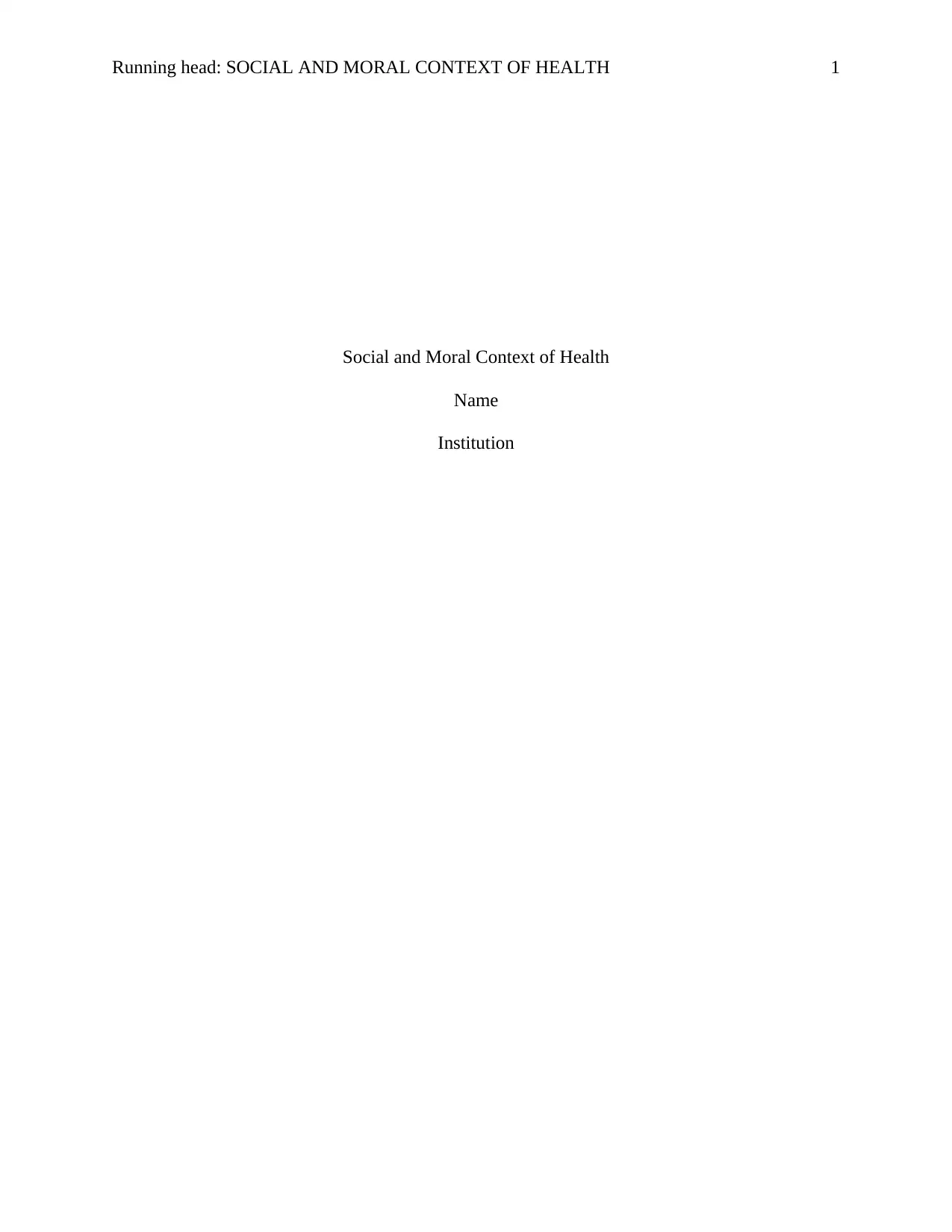
Running head: SOCIAL AND MORAL CONTEXT OF HEALTH 1
Social and Moral Context of Health
Name
Institution
Social and Moral Context of Health
Name
Institution
Paraphrase This Document
Need a fresh take? Get an instant paraphrase of this document with our AI Paraphraser
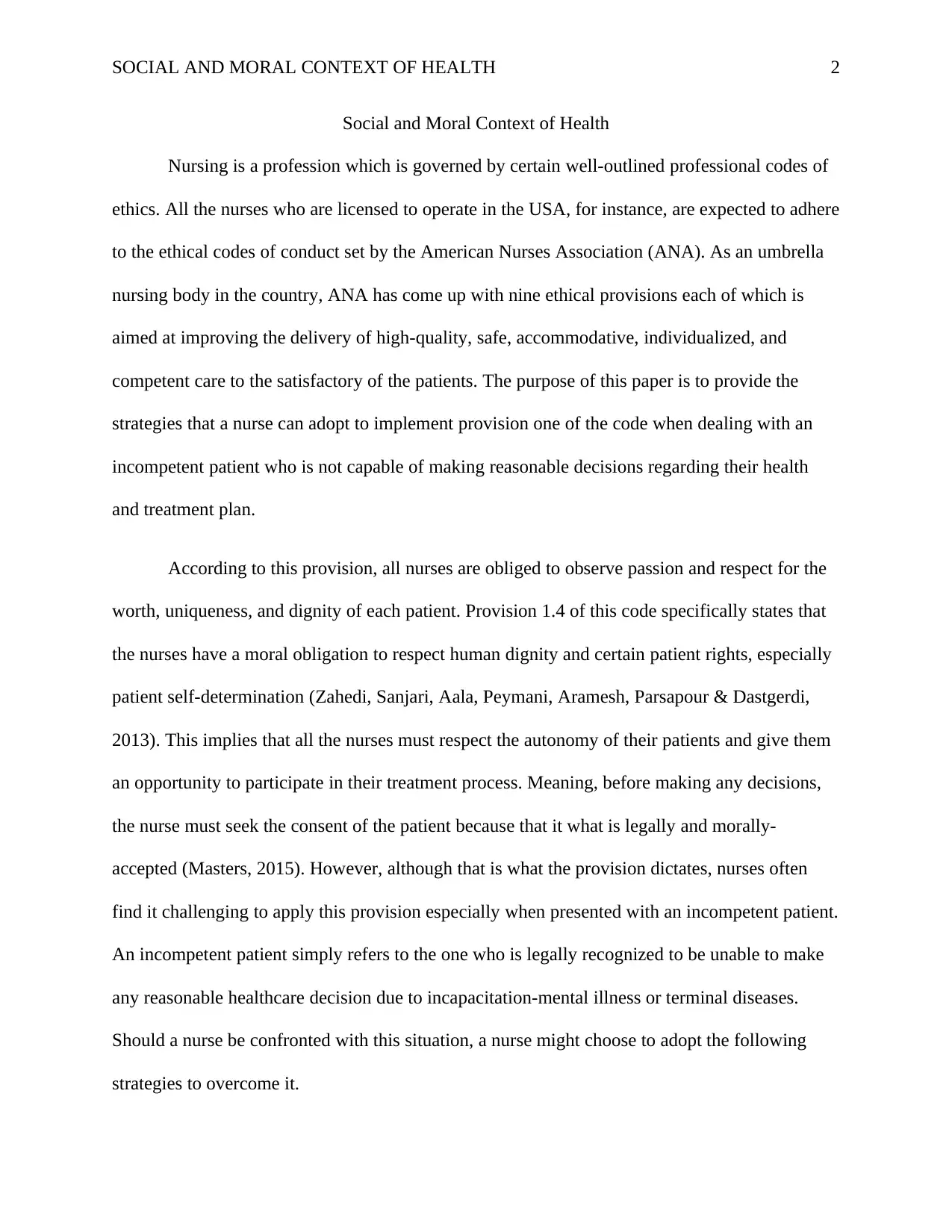
SOCIAL AND MORAL CONTEXT OF HEALTH 2
Social and Moral Context of Health
Nursing is a profession which is governed by certain well-outlined professional codes of
ethics. All the nurses who are licensed to operate in the USA, for instance, are expected to adhere
to the ethical codes of conduct set by the American Nurses Association (ANA). As an umbrella
nursing body in the country, ANA has come up with nine ethical provisions each of which is
aimed at improving the delivery of high-quality, safe, accommodative, individualized, and
competent care to the satisfactory of the patients. The purpose of this paper is to provide the
strategies that a nurse can adopt to implement provision one of the code when dealing with an
incompetent patient who is not capable of making reasonable decisions regarding their health
and treatment plan.
According to this provision, all nurses are obliged to observe passion and respect for the
worth, uniqueness, and dignity of each patient. Provision 1.4 of this code specifically states that
the nurses have a moral obligation to respect human dignity and certain patient rights, especially
patient self-determination (Zahedi, Sanjari, Aala, Peymani, Aramesh, Parsapour & Dastgerdi,
2013). This implies that all the nurses must respect the autonomy of their patients and give them
an opportunity to participate in their treatment process. Meaning, before making any decisions,
the nurse must seek the consent of the patient because that it what is legally and morally-
accepted (Masters, 2015). However, although that is what the provision dictates, nurses often
find it challenging to apply this provision especially when presented with an incompetent patient.
An incompetent patient simply refers to the one who is legally recognized to be unable to make
any reasonable healthcare decision due to incapacitation-mental illness or terminal diseases.
Should a nurse be confronted with this situation, a nurse might choose to adopt the following
strategies to overcome it.
Social and Moral Context of Health
Nursing is a profession which is governed by certain well-outlined professional codes of
ethics. All the nurses who are licensed to operate in the USA, for instance, are expected to adhere
to the ethical codes of conduct set by the American Nurses Association (ANA). As an umbrella
nursing body in the country, ANA has come up with nine ethical provisions each of which is
aimed at improving the delivery of high-quality, safe, accommodative, individualized, and
competent care to the satisfactory of the patients. The purpose of this paper is to provide the
strategies that a nurse can adopt to implement provision one of the code when dealing with an
incompetent patient who is not capable of making reasonable decisions regarding their health
and treatment plan.
According to this provision, all nurses are obliged to observe passion and respect for the
worth, uniqueness, and dignity of each patient. Provision 1.4 of this code specifically states that
the nurses have a moral obligation to respect human dignity and certain patient rights, especially
patient self-determination (Zahedi, Sanjari, Aala, Peymani, Aramesh, Parsapour & Dastgerdi,
2013). This implies that all the nurses must respect the autonomy of their patients and give them
an opportunity to participate in their treatment process. Meaning, before making any decisions,
the nurse must seek the consent of the patient because that it what is legally and morally-
accepted (Masters, 2015). However, although that is what the provision dictates, nurses often
find it challenging to apply this provision especially when presented with an incompetent patient.
An incompetent patient simply refers to the one who is legally recognized to be unable to make
any reasonable healthcare decision due to incapacitation-mental illness or terminal diseases.
Should a nurse be confronted with this situation, a nurse might choose to adopt the following
strategies to overcome it.
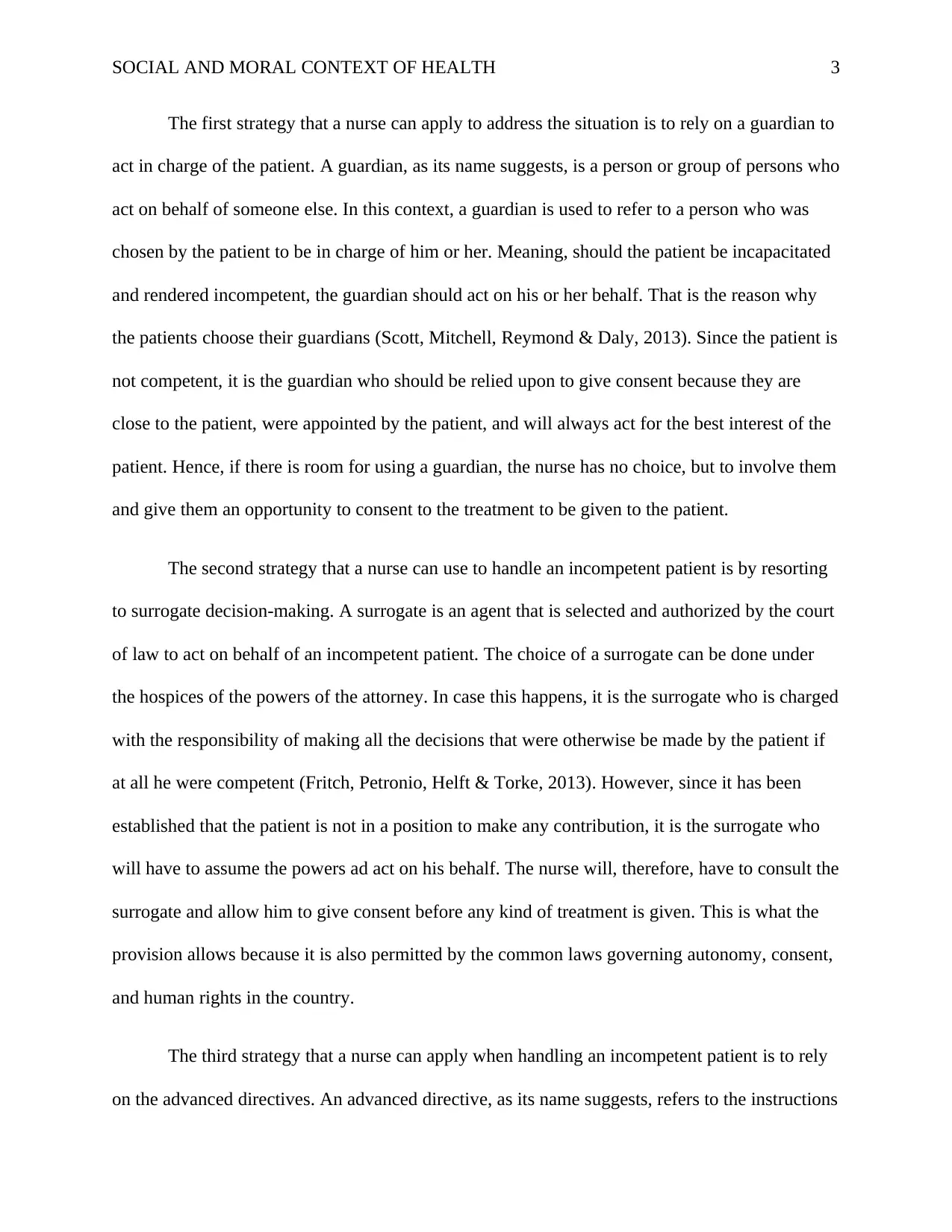
SOCIAL AND MORAL CONTEXT OF HEALTH 3
The first strategy that a nurse can apply to address the situation is to rely on a guardian to
act in charge of the patient. A guardian, as its name suggests, is a person or group of persons who
act on behalf of someone else. In this context, a guardian is used to refer to a person who was
chosen by the patient to be in charge of him or her. Meaning, should the patient be incapacitated
and rendered incompetent, the guardian should act on his or her behalf. That is the reason why
the patients choose their guardians (Scott, Mitchell, Reymond & Daly, 2013). Since the patient is
not competent, it is the guardian who should be relied upon to give consent because they are
close to the patient, were appointed by the patient, and will always act for the best interest of the
patient. Hence, if there is room for using a guardian, the nurse has no choice, but to involve them
and give them an opportunity to consent to the treatment to be given to the patient.
The second strategy that a nurse can use to handle an incompetent patient is by resorting
to surrogate decision-making. A surrogate is an agent that is selected and authorized by the court
of law to act on behalf of an incompetent patient. The choice of a surrogate can be done under
the hospices of the powers of the attorney. In case this happens, it is the surrogate who is charged
with the responsibility of making all the decisions that were otherwise be made by the patient if
at all he were competent (Fritch, Petronio, Helft & Torke, 2013). However, since it has been
established that the patient is not in a position to make any contribution, it is the surrogate who
will have to assume the powers ad act on his behalf. The nurse will, therefore, have to consult the
surrogate and allow him to give consent before any kind of treatment is given. This is what the
provision allows because it is also permitted by the common laws governing autonomy, consent,
and human rights in the country.
The third strategy that a nurse can apply when handling an incompetent patient is to rely
on the advanced directives. An advanced directive, as its name suggests, refers to the instructions
The first strategy that a nurse can apply to address the situation is to rely on a guardian to
act in charge of the patient. A guardian, as its name suggests, is a person or group of persons who
act on behalf of someone else. In this context, a guardian is used to refer to a person who was
chosen by the patient to be in charge of him or her. Meaning, should the patient be incapacitated
and rendered incompetent, the guardian should act on his or her behalf. That is the reason why
the patients choose their guardians (Scott, Mitchell, Reymond & Daly, 2013). Since the patient is
not competent, it is the guardian who should be relied upon to give consent because they are
close to the patient, were appointed by the patient, and will always act for the best interest of the
patient. Hence, if there is room for using a guardian, the nurse has no choice, but to involve them
and give them an opportunity to consent to the treatment to be given to the patient.
The second strategy that a nurse can use to handle an incompetent patient is by resorting
to surrogate decision-making. A surrogate is an agent that is selected and authorized by the court
of law to act on behalf of an incompetent patient. The choice of a surrogate can be done under
the hospices of the powers of the attorney. In case this happens, it is the surrogate who is charged
with the responsibility of making all the decisions that were otherwise be made by the patient if
at all he were competent (Fritch, Petronio, Helft & Torke, 2013). However, since it has been
established that the patient is not in a position to make any contribution, it is the surrogate who
will have to assume the powers ad act on his behalf. The nurse will, therefore, have to consult the
surrogate and allow him to give consent before any kind of treatment is given. This is what the
provision allows because it is also permitted by the common laws governing autonomy, consent,
and human rights in the country.
The third strategy that a nurse can apply when handling an incompetent patient is to rely
on the advanced directives. An advanced directive, as its name suggests, refers to the instructions
⊘ This is a preview!⊘
Do you want full access?
Subscribe today to unlock all pages.

Trusted by 1+ million students worldwide
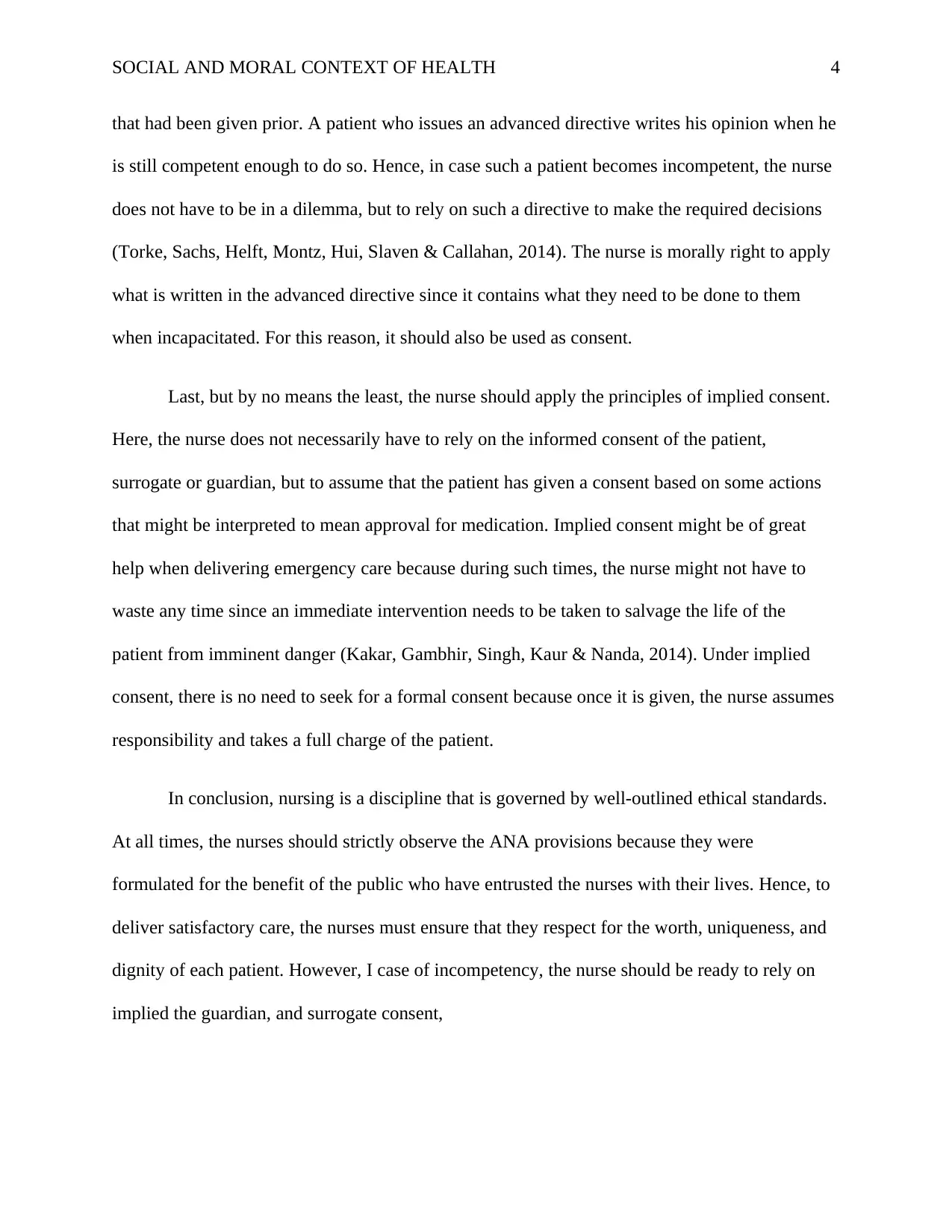
SOCIAL AND MORAL CONTEXT OF HEALTH 4
that had been given prior. A patient who issues an advanced directive writes his opinion when he
is still competent enough to do so. Hence, in case such a patient becomes incompetent, the nurse
does not have to be in a dilemma, but to rely on such a directive to make the required decisions
(Torke, Sachs, Helft, Montz, Hui, Slaven & Callahan, 2014). The nurse is morally right to apply
what is written in the advanced directive since it contains what they need to be done to them
when incapacitated. For this reason, it should also be used as consent.
Last, but by no means the least, the nurse should apply the principles of implied consent.
Here, the nurse does not necessarily have to rely on the informed consent of the patient,
surrogate or guardian, but to assume that the patient has given a consent based on some actions
that might be interpreted to mean approval for medication. Implied consent might be of great
help when delivering emergency care because during such times, the nurse might not have to
waste any time since an immediate intervention needs to be taken to salvage the life of the
patient from imminent danger (Kakar, Gambhir, Singh, Kaur & Nanda, 2014). Under implied
consent, there is no need to seek for a formal consent because once it is given, the nurse assumes
responsibility and takes a full charge of the patient.
In conclusion, nursing is a discipline that is governed by well-outlined ethical standards.
At all times, the nurses should strictly observe the ANA provisions because they were
formulated for the benefit of the public who have entrusted the nurses with their lives. Hence, to
deliver satisfactory care, the nurses must ensure that they respect for the worth, uniqueness, and
dignity of each patient. However, I case of incompetency, the nurse should be ready to rely on
implied the guardian, and surrogate consent,
that had been given prior. A patient who issues an advanced directive writes his opinion when he
is still competent enough to do so. Hence, in case such a patient becomes incompetent, the nurse
does not have to be in a dilemma, but to rely on such a directive to make the required decisions
(Torke, Sachs, Helft, Montz, Hui, Slaven & Callahan, 2014). The nurse is morally right to apply
what is written in the advanced directive since it contains what they need to be done to them
when incapacitated. For this reason, it should also be used as consent.
Last, but by no means the least, the nurse should apply the principles of implied consent.
Here, the nurse does not necessarily have to rely on the informed consent of the patient,
surrogate or guardian, but to assume that the patient has given a consent based on some actions
that might be interpreted to mean approval for medication. Implied consent might be of great
help when delivering emergency care because during such times, the nurse might not have to
waste any time since an immediate intervention needs to be taken to salvage the life of the
patient from imminent danger (Kakar, Gambhir, Singh, Kaur & Nanda, 2014). Under implied
consent, there is no need to seek for a formal consent because once it is given, the nurse assumes
responsibility and takes a full charge of the patient.
In conclusion, nursing is a discipline that is governed by well-outlined ethical standards.
At all times, the nurses should strictly observe the ANA provisions because they were
formulated for the benefit of the public who have entrusted the nurses with their lives. Hence, to
deliver satisfactory care, the nurses must ensure that they respect for the worth, uniqueness, and
dignity of each patient. However, I case of incompetency, the nurse should be ready to rely on
implied the guardian, and surrogate consent,
Paraphrase This Document
Need a fresh take? Get an instant paraphrase of this document with our AI Paraphraser
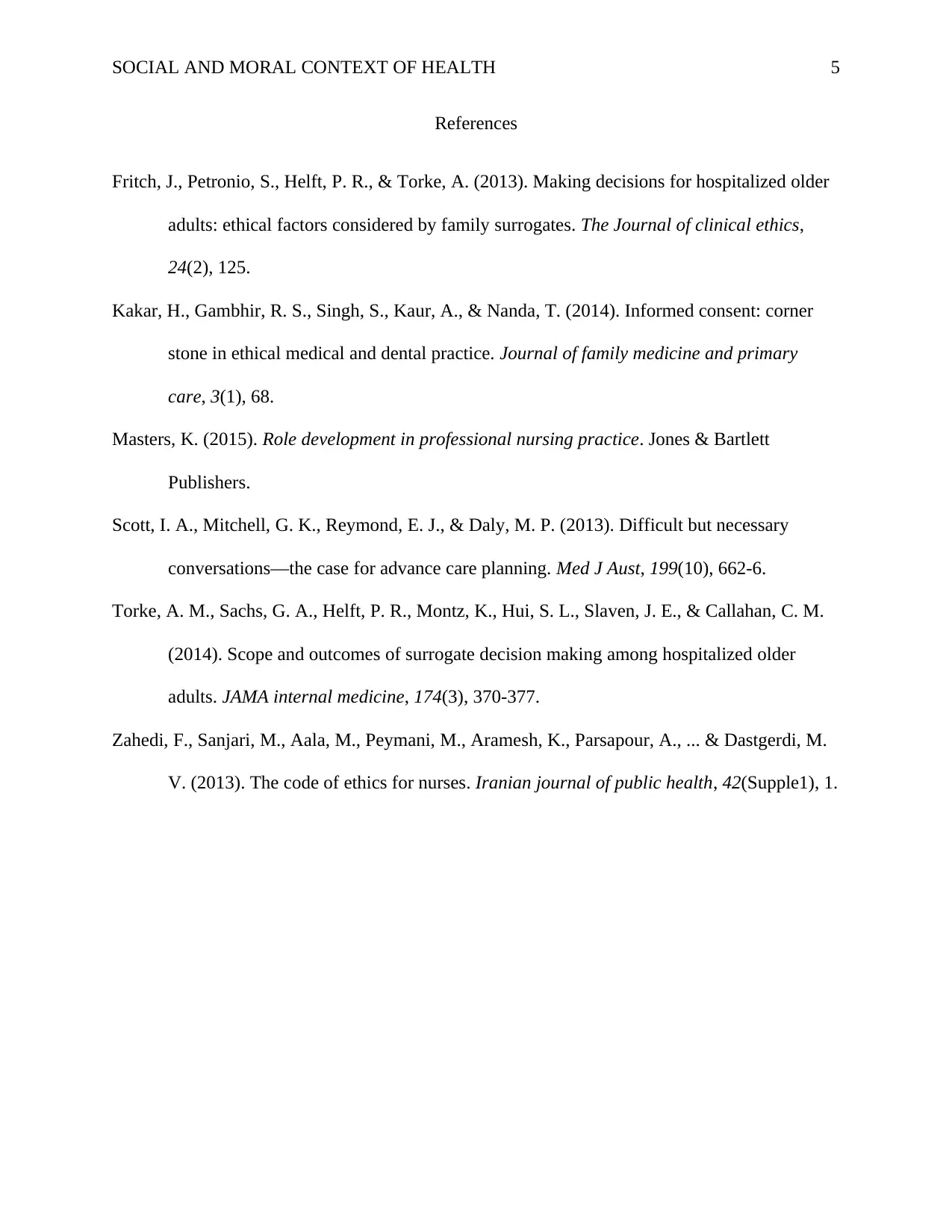
SOCIAL AND MORAL CONTEXT OF HEALTH 5
References
Fritch, J., Petronio, S., Helft, P. R., & Torke, A. (2013). Making decisions for hospitalized older
adults: ethical factors considered by family surrogates. The Journal of clinical ethics,
24(2), 125.
Kakar, H., Gambhir, R. S., Singh, S., Kaur, A., & Nanda, T. (2014). Informed consent: corner
stone in ethical medical and dental practice. Journal of family medicine and primary
care, 3(1), 68.
Masters, K. (2015). Role development in professional nursing practice. Jones & Bartlett
Publishers.
Scott, I. A., Mitchell, G. K., Reymond, E. J., & Daly, M. P. (2013). Difficult but necessary
conversations—the case for advance care planning. Med J Aust, 199(10), 662-6.
Torke, A. M., Sachs, G. A., Helft, P. R., Montz, K., Hui, S. L., Slaven, J. E., & Callahan, C. M.
(2014). Scope and outcomes of surrogate decision making among hospitalized older
adults. JAMA internal medicine, 174(3), 370-377.
Zahedi, F., Sanjari, M., Aala, M., Peymani, M., Aramesh, K., Parsapour, A., ... & Dastgerdi, M.
V. (2013). The code of ethics for nurses. Iranian journal of public health, 42(Supple1), 1.
References
Fritch, J., Petronio, S., Helft, P. R., & Torke, A. (2013). Making decisions for hospitalized older
adults: ethical factors considered by family surrogates. The Journal of clinical ethics,
24(2), 125.
Kakar, H., Gambhir, R. S., Singh, S., Kaur, A., & Nanda, T. (2014). Informed consent: corner
stone in ethical medical and dental practice. Journal of family medicine and primary
care, 3(1), 68.
Masters, K. (2015). Role development in professional nursing practice. Jones & Bartlett
Publishers.
Scott, I. A., Mitchell, G. K., Reymond, E. J., & Daly, M. P. (2013). Difficult but necessary
conversations—the case for advance care planning. Med J Aust, 199(10), 662-6.
Torke, A. M., Sachs, G. A., Helft, P. R., Montz, K., Hui, S. L., Slaven, J. E., & Callahan, C. M.
(2014). Scope and outcomes of surrogate decision making among hospitalized older
adults. JAMA internal medicine, 174(3), 370-377.
Zahedi, F., Sanjari, M., Aala, M., Peymani, M., Aramesh, K., Parsapour, A., ... & Dastgerdi, M.
V. (2013). The code of ethics for nurses. Iranian journal of public health, 42(Supple1), 1.
1 out of 5
Related Documents
Your All-in-One AI-Powered Toolkit for Academic Success.
+13062052269
info@desklib.com
Available 24*7 on WhatsApp / Email
![[object Object]](/_next/static/media/star-bottom.7253800d.svg)
Unlock your academic potential
Copyright © 2020–2026 A2Z Services. All Rights Reserved. Developed and managed by ZUCOL.





